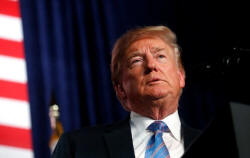Trump's $500 billion trade threat makes China's already
battered investors shiver
 Send a link to a friend
Send a link to a friend
 [July 06, 2018]
By Samuel Shen and Vidya Ranganathan [July 06, 2018]
By Samuel Shen and Vidya Ranganathan
SHANGHAI/SINGAPORE (Reuters) - Six months
of wrangling over trade tariffs with the United States has wiped out
about a fifth of China's stock market value and driven its currency down
sharply. But those moves may have just been a downpayment on what is yet
to come.
Shanghai's benchmark share index <.SSEC> is down roughly 22 percent
since January, when U.S. President Donald Trump's first trade tariffs on
solar panels were announced. It has fallen 9 percent since June 19, when
Trump outlined his plans to tax a lot more Chinese imports than he
initially proposed.
Tariffs on the first batch of $34 billion worth of Chinese imports
kicked in on Friday. Beijing said it had no choice but to respond in
kind by taxing a similar amount of U.S. goods coming into China. U.S.
tariffs on another $16 billion of Chinese goods are due to go into
effect in two weeks, Trump said on Thursday.
But Trump also raised the temperature much further by telling reporters
that after the initial $50 billion of goods has been targeted with
tariffs, Washington could add another $500 billion.

With Beijing indicating it will respond with tariffs on more U.S.
imports or other corresponding actions of its own, the specter of a
full-blown trade war risks sinking China's markets deeper into bear
territory.
Initial market estimates of the impact of tit-for-tat Chinese and U.S.
tariffs have been modest. A China central bank adviser, Ma Jun, said
U.S. tariffs on $50 billion worth of Chinese goods will shave 0.2
percentage points off Chinese growth.
Market economists reckoned that every $100 billion of imports affected
by tariffs would take away around 0.5 percent of global trade. And they
have assumed a direct impact on China's economic growth in 2018 of
0.1-0.3 percentage points, and a somewhat lower effect on U.S. growth.
But the massive scale of Trump's suggested new U.S. tariffs - 10 times
the initial $50 billion - would blow any such modest predictions out of
the water.
"The bigger the size (of imports facing tariffs), the bigger the
potential that the GDP impact is larger than a linear extrapolation
would suggest," said Aidan Yao, senior emerging Asia economist at AXA
Investment Managers in Hong Kong.
There were other secondary effects on confidence, investment and global
supply chains to be considered, besides the impact on the economy
through financial markets, wealth effects and corporate funding, he
said.
"The risk is we underestimate the impact based on these simple
back-of-the-envelope calculations."
BOTTOMLESS
Given the uncertainty over the trade dispute, securities analysts in
China suggest investors should just sell shares and hold onto cash.
"The bottom for A-shares is nowhere in sight," said Samuel Chien,
partner of Shanghai BoomTrend Investment Management Co.

"Whether you look at fundamental factors, or market psychology, there's
nothing bright - a Sino-U.S. trade war will have a seriously negative
impact on China's economy," Chien said.
He said he fears the Shanghai index, now trading at 2,747 points, could
shed another quarter of its value to get as low as 2,000 in the next 6
to 12 months.
The yuan currency <CNY=CFXS> has stabilized around 6.65 per dollar this
week after Chinese state banks intervened to defend it at 11-month lows.
It has dropped nearly 7 percent since April.
(GRAPHIC: Trade tensions in China's stock, currency markets - https://reut.rs/2KTfIcH)
While U.S. stock markets have been more stable than China's during these
past months of escalating trade tensions, analysts warn against
discounting Beijing's capacity to retaliate.
[to top of second column] |

U.S. President Donald Trump delivers remarks at a "Salute to
Service" dinner held in honor of the nation's military at The
Greenbrier in White Sulphur Springs, West Virginia, U.S., July 3,
2018. REUTERS/Leah Millis

China has taken a softer, conciliatory approach so far, but investors only need
to hark back to last year when South Korean companies bore the brunt of a
backlash from China over Seoul's deployment of a U.S. missile system.
The companies lost billions of dollars in market value after a Chinese boycott
of Korean goods, group tours to South Korea, and the targeting of one
conglomerate in particular, Lotte Group, for various regulatory inspections at
its stores in China. Lotte had swapped some land with the South Korean
government to enable the missile system's deployment.
The analysts say that Beijing could suddenly make it very difficult for U.S.
companies to operate in China, whether it be getting contracts, licenses or
regulatory approvals. If patriotic Chinese consumers were also unleashed,
damaging boycotts of American goods could follow.
Perhaps the most threatening thing Beijing could do would be to unload some of
its massive holdings of U.S. Treasuries - it is currently the biggest foreign
owner.
"China’s big stick is the bond market," said Stephen Innes, head of APAC trading
at OANDA in Singapore. He said that Beijing would use that strategy "if it is
necessary."
Such action would likely send Treasury yields significantly higher and raise
U.S. government borrowing costs. It would also hurt China's remaining holdings
of the securities, which is one reason it would probably only be used as a last
resort.
BEAR TERRITORY
In the meantime, technical indicators, from margin lending for shares to the
prices of stock index futures, already point to a deeper slump in China's stock
markets.
The SSE50 Index <.SSE50> which tracks blue-chip shares hit a 13-month low on
Thursday and has slumped roughly 12 percent in the past two weeks.

In a sign market bulls are throwing in the towel, the outstanding value of
margin financing - the money investors borrow to buy shares - has rapidly
shrunk. <aCNMGTBA>
Roughly 70 billion yuan ($10.55 billion) worth of leveraged bets were unwound
over the past month alone, representing 7 percent of the total bets.
On the other hand, the outstanding value of shares investors have borrowed to
sell has jumped 45 percent this year to 6.5 billion yuan, despite several
restrictions placed on such direct short-selling.
Foreign investors are turning bearish on China stocks, too. Nearly uninterrupted
foreign inflows into Chinese stocks this year, spurred by optimism around MSCI
Inc's inclusion of A-shares in its indexes on June 1, have reversed course since
mid-June.
"Even if the market is technically oversold, sentiment is low and valuations are
lower, it is still too early to catch falling knives, as there will be further
selling for structural liquidity reasons from anywhere," said Hong Hao, head of
research at BOCOM International.
"At times like these, technical rebounds will be fleeting."
(Additional reporting by Marius Zaharia in HONG KONG, Daniel Leussink in TOKYO;
Editing by Vidya Ranganathan and Martin Howell)
[© 2018 Thomson Reuters. All rights
reserved.] Copyright 2018 Reuters. All rights reserved. This material may not be published,
broadcast, rewritten or redistributed.
Thompson Reuters is solely responsible for this content.
 |